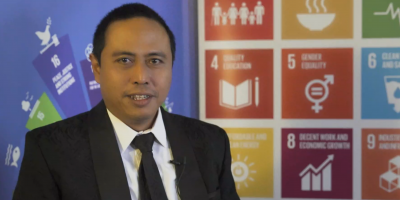
Kristomo Constantinus: mobilizing partnerships and boosting innovation as keys to achieve SDG 16 in Indonesia
Kristomo Constantinus, Head of the legal service division of the West Papua province office of the Indonesian Ministry of Law and Human Rights, has dedicated his career to multifaceted legal aid issues. In an earlier role as head of the legal aid division of the Ministry, he was one of the founders of the legal aid information and database system that was prized as the TOP 99 Indonesia Public Service Innovation Award 2017 and 2018.
IDLO spoke with Kristomo Constantinus in the margins of the Global Conference on SDG 16 to discuss how public and private partnerships as well as innovation can help enhance access to justice for citizens of a territory with unique geographical features.
Could you describe how your organization is implementing SDG 16?
My organization works on SDG 16.3 to promote the rule of law and ensure equal access to justice for all. Under this goal, we handle a program on free legal aid for the poor. To run this program, we use a collaborative approach between three main stakeholders. The first one is us, the Government, the administrators who select, verify and identify potential legal providers; the second is the Civil Society Organizations (CSOs) who are very much engaged in all the different steps of the program; and thirdly, the beneficiaries, the poor people themselves. Thanks to this tripartite partnership, we now have 524 legal aid providers in Indonesia. However, given the size of the Indonesian territory with thousands of islands, 250 million people among which 26 million are poor, this is far from being enough. This weak ratio is our first challenge. Out of 560 regions, only 41% have accredited legal aid providers. Our second challenge is therefore that some entire regions are not covered and have no legal providers at all. Finally, the third challenge is budget. The 50 billion Indonesian Rupiah allowed national legal aid budget is all too little to cover our needs.
How do we overcome these challenges? Firstly, we encourage our local provinces’ governments to also provide a local budget for legal aid so that legal aid providers have access to more budget. We further encourage private law firms to use their pro bono commitment to cover cases which are not covered by state budget and cases of people who are not poor but neither rich enough to afford lawyer fees.
Could you tell us about one innovation that you’re using to implement SDG 16 in Indonesia?
Implementing SDG 16 in Indonesia is done in phases where innovation is a necessity. One of the main innovations that I could mention is the online information and data system for legal aid which is used, for instance to let the accredited legal aid organizations report online the cases they handle. This used to be a manual hardcopy process. The CSO/legal aid organizations only get reimbursed per case handled and only after reporting on those individual cases. The fact that they can do that online now and can for instance avoid hard copy supporting documents, is an innovation.
We also developed an application by which Indonesian people are informed that free legal consultation is available for them and where to get the help from legal providers. This application is constantly being developed further. As Indonesia is a large territory with some unique geographical features, the use of IT seems to be the best solution to reach and inform people.
Another innovation that I would like to mention is this initiative that we took in the West Papua province early February where we started training 200 priests and heads of tribes to become paralegals. Indeed, as leaders of their communities, they are very much listened to by Indonesian citizens. By giving them some paralegal skills, they will be able to provide legal consultations and give direct legal aid. According to some of their testimonies, our people in the West Papua province struggle a lot with domestic violence. Having been trained, they will be able to give legal advice and not just pray which I feel is good.
The priests that we trained were also taught that they could go to a police station and represent the members of their church. We also taught them about human rights and more human rights trainings are scheduled. Out of this initiative of training 200 priests, we are able and about to establish 50 legal posts. Such legal posts will hopefully help address the many human rights violations that West Papua face. People suffering and feeling neglected by the government will understand we hope, that these legal posts can really help them.
Is there anything you would like to highlight in your efforts to reach SDG 16?
Inclusivity. What I mean by that is for the private sector to engage more in the implementation of SDGs. So far, we tried to encourage the bar associations and some private law firms to provide pro bono legal services but we need the involvement from many more. We need the whole private sector to be on board. It is only together that we will be able to solve problems. In Indonesia today, involving the private sector more, so that they go beyond giving pro bono or philanthropic help is the absolute key challenge.

